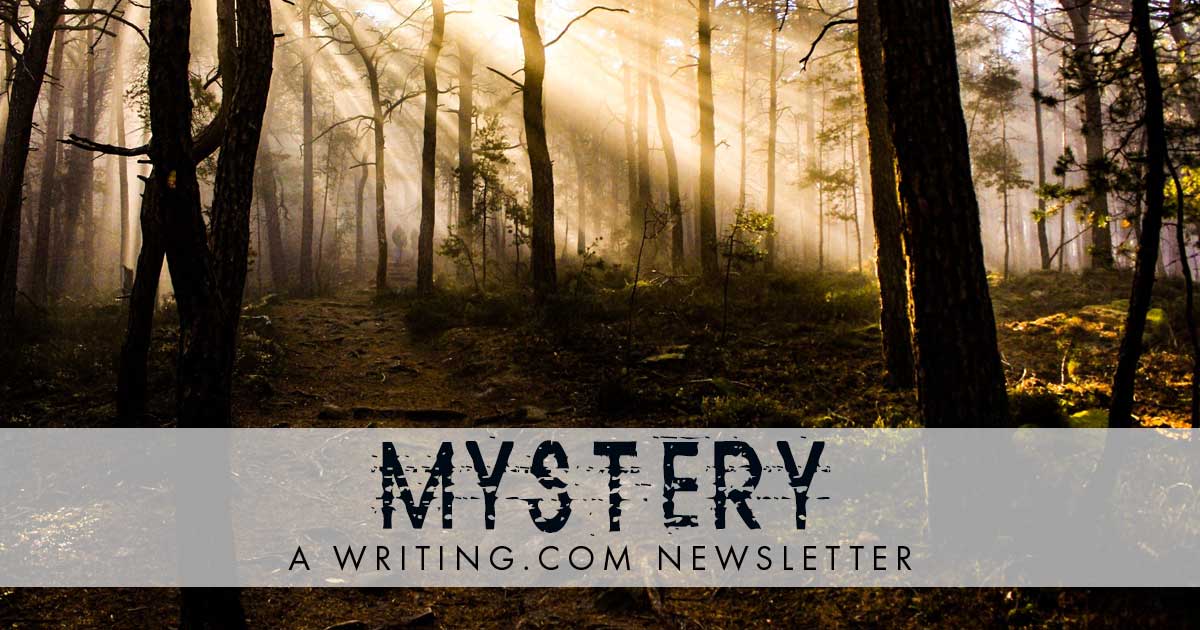This week: Seeing the forest and the trees Edited by: Arakun the Twisted Raccoon  
More Newsletters By This Editor 
![Table of Contents [#401437]
Table of Contents](https://www.Writing.Com/main/trans.gif) ![Table of Contents [#401437]
Table of Contents Table of Contents](/main/images/action/display/ver/1709303267/item_id/401437.png)
1. About this Newsletter
2. A Word from our Sponsor
3. Letter from the Editor
4. Editor's Picks
5. A Word from Writing.Com
6. Ask & Answer
7. Removal instructions
![About This Newsletter [#401439]
About This Newsletter](https://www.Writing.Com/main/trans.gif) ![About This Newsletter [#401439]
About This Newsletter About This Newsletter](https://www.writing.com/main/images/action/display/ver/1709303676/item_id/401439.png)
Quote for the week:
"Mystery spread its cloak across the sky.
We lost our way.
Shadows fell from trees.
They knew why."
~ From "House of Four Doors" By the Moody Blues |
![Letter from the editor [#401442]
Letter from the editor](https://www.Writing.Com/main/trans.gif) ![Letter from the editor [#401442]
Letter from the editor Letter from the editor](https://www.writing.com/main/images/action/display/ver/1709303784/item_id/401442.png)
When your characters are gathering clues, eventually they will have to look past the trees and see the forest. The sheer amount of information that can be gathered from a complicated crime scene can be overwhelming.
This information might include fingerprints, blood and other DNA evidence, footprints, vehicle tracks, surveillance video, threads and other trace evidence, witness statements, interviews with neighbors or bystanders, and more.
After all the information has been gathered, the investigators need to determine which pieces of evidence are actually important.
Even though a great deal of information must be gathered, much of it is meaningless as far as solving the crime. For example, a person's fingerprints or DNA an a place where they live or work are to be expected and cannot connect them to a crime that happened there.
Some pieces of information might be red herrings that lead the investigators (and readers) away from the correct solution. For example, a witness might see a person who appears to be running away from a crime scene, but investigators might learn that that person was running for an entirely different reason and has nothing to do with the crime.
In some cases, what is not found at the scene might be almost as important as what is found. Is a knife or other potential weapon missing from the kitchen? If the crime was a robbery, what seems to be missing? What valuable items were not taken? In a case where a victim is stabbed or shot several times, is there very little blood found at the scene? Or is there lots of blood, but no body? Does the area seem to have been thoroughly cleaned recently? Is a weapon found with no fingerprints? Is a coat or other clothing missing from a closet? Does a person who was in the next room or extremely close by claim to have heard nothing? Are there no signs of a break in?
A criminal investigation isn't always like following a clear path through the woods that leads to the correct solution. It is more like a network of paths. Some lead nowhere or in a circle. Others might seem like promising paths but actually lead your characters astray. Remember that if the path is too clear, the story won't be as interesting to readers as one with several blind alleys or false starts. You don't want your characters to appear stupid, but you don't want the solution to be too easy either.
Something to try: Write a mystery story where characters have to pick their way through seemingly contradictory evidence. |
![Editor's Picks [#401445]
Editor's Picks](https://www.Writing.Com/main/trans.gif) ![Editor's Picks [#401445]
Editor's Picks Editor's Picks](https://www.writing.com/main/images/action/display/ver/1709303830/item_id/401445.png)
| |  | Invalid Item 
This item number is not valid.
#2256815 by Not Available. |
| |  | Invalid Item 
This item number is not valid.
#2287086 by Not Available. |
|
![Word From Writing.Com [#401447]
Word from Writing.Com](https://www.Writing.Com/main/trans.gif) ![Word From Writing.Com [#401447]
Word from Writing.Com Word from Writing.Com](https://www.writing.com/main/images/action/display/ver/1709303874/item_id/401447.png)
Have an opinion on what you've read here today? Then send the Editor feedback! Find an item that you think would be perfect for showcasing here? Submit it for consideration in the newsletter!
https://www.Writing.Com/go/nl_form
![Ask & Answer [#401448]
Ask & Answer](https://www.Writing.Com/main/trans.gif) ![Ask & Answer [#401448]
Ask & Answer Ask & Answer](https://www.writing.com/main/images/action/display/ver/1709303902/item_id/401448.png)
Question for next time:
What topics would you like to see discussed in future mystery newsletters? |
![Unsubscribe [#401452]
Removal Instructions](https://www.Writing.Com/main/trans.gif) ![Unsubscribe [#401452]
Removal Instructions Removal Instructions](https://www.writing.com/main/images/action/display/ver/1709303960/item_id/401452.png)
To stop receiving this newsletter, click here for your newsletter subscription list. Simply uncheck the box next to any newsletter(s) you wish to cancel and then click to "Submit Changes". You can edit your subscriptions at any time.
|
